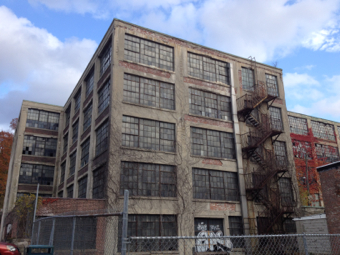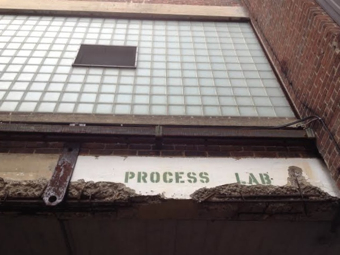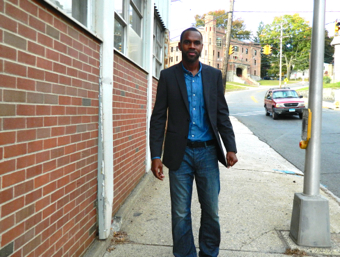 The City of Ansonia sent a blight citation Wednesday (Nov. 12) to Moustapha Diakhate, the owner of more than 10 acres of downtown real estate, threatening daily fines upward of $20,000 if he does not fix up 501 E. Main St., the most rundown of his local holdings.
The City of Ansonia sent a blight citation Wednesday (Nov. 12) to Moustapha Diakhate, the owner of more than 10 acres of downtown real estate, threatening daily fines upward of $20,000 if he does not fix up 501 E. Main St., the most rundown of his local holdings.
“We want it cleaned up because it needs to be cleaned up,” Ansonia Mayor David Cassetti said Wednesday. “It’s a mess. It’s terrible. People have commented and asked ‘What are you doing about it?’ We decided to put our foot down.”
And last month a South Windsor-based company that financed Diakhate’s January 2013 purchase of the building filed foreclosure paperwork in City Hall.
Diakhate said in an email late Wednesday that he’ll present redevelopment plans as early as next week for the property. He said the property’s foreclosure is also under control.
Background
Diakhate’s company, Washington Management LLC, bought the properties formerly owned by the Farrel Corp. for $1.9 million in January 2013.
At the time, he and officials envisioned the properties as a mixed-use development of residential and retail space.
Here is the Valley Indy video of the press conference from 2013: The article continues below.
Months went by, and some preliminary sketches were passed around City Hall, but no plans have ever officially gone before the city’s Planning and Zoning Commission.
Meanwhile, the city saw a new administration sweep into office, led by a mayor, David Cassetti, who campaigned on attracting businesses to the city in part by pushing redevelopment at dozens of acres of blighted former factory space downtown.
Soon after taking office — and replacing city’s anti-blight-officer — Cassetti sent David Blackwell Sr., the current anti-blight officer, to downtown properties like Diakhate’s and the nearby Ansonia Copper and Brass Inc. to check them out.
The message was clear — come to the table and make a deal with the city to clean up your properties or face the threat of heavy blight fines.
In the case of Ansonia Copper and Brass, Cassetti’s ultimatum prompted action — the company signed a deal with the city to begin demolition there in exchange for a portion of its property taxes being forgiven.
 Blight Citation
Blight Citation
City officials were also trying to talk Diakhate into a deal — to buy two blighted downtown properties the city owns next to his as part of his redevelopment plans.
Cassetti and Sheila O’Malley, the city’s economic development director, said Wednesday that the offer is still be on the table.
Blight Threat
Ansonia officials said the blight letter sent Wednesday signals that the city has waited long enough to see something done and is now willing to play hardball.
The mayor said the blight citation sends a simple message to Diakhate: “Sit down with us.”
The citation for 501 E. Main St., the former process lab, lists fines totaling $20,700 per day that could be levied against the property unless cleaned up.
The citation notes about 200 broken or partially broken windows around the building, as well as graffiti, vegetation overgrowth, crumbling cement, and exposed rebar.
Foreclosure?
Blight fines might not be the only threat to Diakhate’s redevelopment plan.
Last month, RCN Capital, a South Windsor-based company that loaned Diakhate $2 million to buy the former Farrel buildings, filed notice in City Hall of its intention to foreclose on the properties.
The Valley Indy left messages Wednesday for the company’s CEO, Donald Vaccaro, as well as the lawyer who filed the foreclosure notice.
Vaccaro is the founder of TicketNetwork, which operates an online marketplace for sports and entertainment events.
According to a profile in the Hartford Business Journal, he started a lending company to offer “high-interest, short-term loans to people looking to make a quick buck in the real estate market.”
The mortgage filed in City Hall on the properties calls for monthly payments of $20,000, but the foreclosure notice does not indicate whether payments were made or when they stopped.
 Developer: ‘Nothing To Worry About’
Developer: ‘Nothing To Worry About’
Diakhate said in an e‑mail to the Valley Indy Wednesday afternoon that he was “aware of” the foreclosure notice “and it’s being handled by our finance and attorney teams.”
“Nothing to worry about, this project is still going forward,” he said.
Diakhate said his architect might have updated plans to redevelop the properties as early as next week.
As far as the blight citation, Diakhate said he understands the city’s concerns.
He said he hasn’t replaced the windows at the process lab because there is no power there, and boarding them up with wood would prevent his architects from doing work.
“I plan on having the windows replaced, outside bricks resurfaced and painted starting very soon,” Diakhate said. “A little curb appeal I am sure will be welcomed by everybody.”
What Happens Next?
John Marini, the city’s corporation counsel and the author of a beefed-up blight ordinance passed this year by Aldermen, said that after receiving the blight citation, Diakhate could:
- Fix the “blight conditions” cited in the city’s letter to him, in which case the fines wouldn’t go into effect;
- Appeal the citation, and present a plan to clean up the properties at a subsequent hearing;
If the city doesn’t hear back from Diakhate, it could start levying fines against the property after 10 days, and, per the new ordinance, clean the property up itself and send the bill to Diakhate.
Marini said the city has already put up fencing on the property to seal off an alley between East Main Street and Main Street.
But he said the city isn’t trying to be “punitive” by threatening Diakhate with daily blight fines of more than $20,000.
He noted the city also sent a blight notice Wednesday to Pandel Properties, a Seymour-based company that owns 35. N. Main St., a 180,000-square-foot albatross sandwiched between the Ansonia Copper & Brass and former Farrel properties with a roof so dilapidated that cops have to close the sidewalk next to it on really windy days.
“We’re not trying to extract a pound of flesh with this,” he said. “We’re just trying to push development along. We want to see these properties going to their highest and best use, back on the tax rolls and back to being productive. The blight ordinance just gives us leverage that we didn’t have before.”
Click here to read a guest column from developer John Guedes, who was successfully redeveloped large industrial buildings into housing along the Housatonic River in Shelton.